Kevin Clarke
Operetta Research Center
2 May, 2017
It’s quite a miracle: a full cast album of Franz von Suppé’s exotic Die Afrikareise, recorded live and in an English language version at Maddermarket Theatre, Norwich, in December 2016. With the Imperial Vienna Orchestra conducted by Dario Salvi, and with ten soloists. It’s now available as a double-disc. Who can ask for anything more, you might ask from the bottom of your operetta-hungry heart?
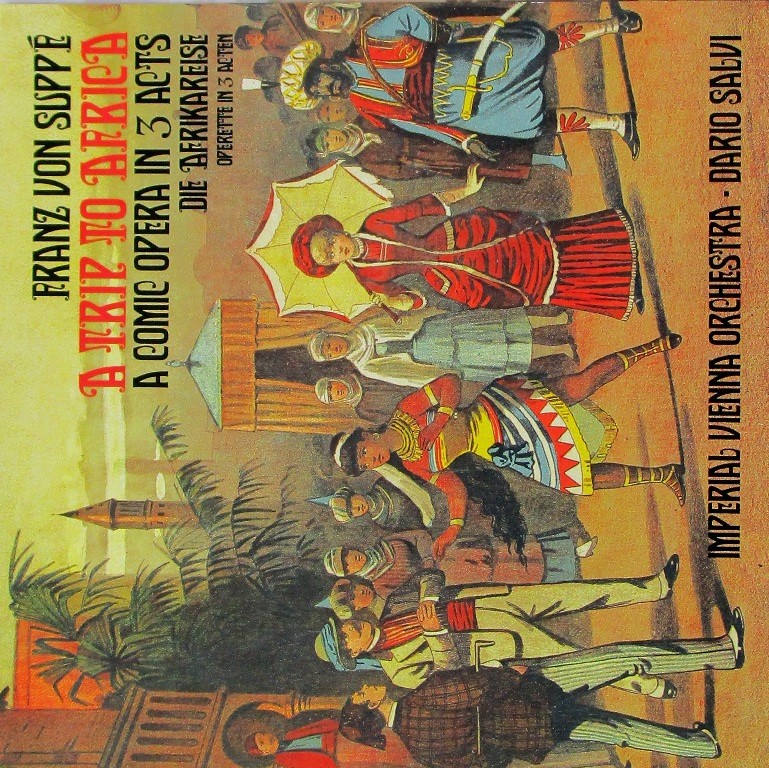
CD cover for “A Trip to Africa” with the Imperial Vienna Orchestra.
Reviving Suppé and his 1883 slapstick extravaganza which originally premiered at the Theater an der Wien with a superstar cast – including comedian Alexander Girardi and soubrette Caroline Finaly – is a tricky enterprise. The story is set in Cairo and involves Europeans who get mixed up with representatives of the Orient and their respective “oriental” attitudes. This requires great comic timing from the actors to make the short, often unrelated yet colorful scenes enjoyable. You also need to find a way to make the culture-clash story enjoyable for modern viewers accustomed to horrific daily news about culture-clashes between the so called West and the Arab world. Can we still laugh at lusty old men à la Osmin from Entführung aus dem Serail who get tricked by clever young European ladies? Can we still laugh at superior white Europeans treating locals in Cairo like idiots and rob them of their money? The answer to this depends on how you do it. In principle, there is nothing wrong with re-examining such a story from colonial times for a post-colonial audience today. In contrast to many other operettas, Suppé’s Afrikareise poses many blatantly obvious political questions that could not be more topical, even if the libretto by Moritz West (= Dr. Moritz Nitzelberger) and Richard Genée is not the most polished text in circulation.

Pasha Fanfani (center) with Bedouins, on the poster for the 1884 production of “A Trip to Africa” at Haverly’s Theatre, Broad Street, Philadelphia. (Photo: Dario Salvi Collection)
Conductor Dario Salvi has prepared a new English language version for the Maddermarket Theatre performances, based on the historic US translation used for a 19th century Boston production. This libretto has been published in book form, at Cambridge Scholars Publishing. You will probably need it to figure out who is singing what on this recording, as there is no libretto included in the booklet, only a short plot summery: a synopsis from the 1884 program of the Boston Bijou Opera Company.
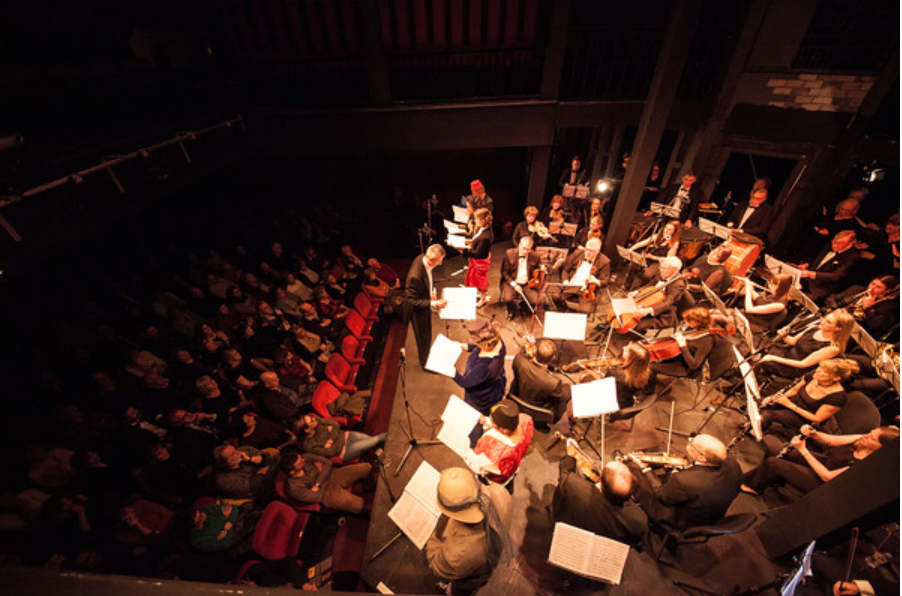
Dario Salvi conducting the Imperial Vienna Orchestra in a performance of “A Trip to Africa” at Maddermarket Theatre, Norwich. (Photo: Mark Stimpson Photography)
The soloists sing with very clear diction, which is a great plus. But because the story involves so many side-characters it’s often difficult to figure out what is going on. There is no dialogue included on the disc and no other form of linking narrative. And the singing itself is … shall we say: uneven? As a matter of fact, some of it is even borderline. I hesitate to write this, because some of the male voices are pleasantly unoperatic and straight forward, which I admire, but they don’t really record well. Which is even more true for the women who sound shrill and off-key most of the time.
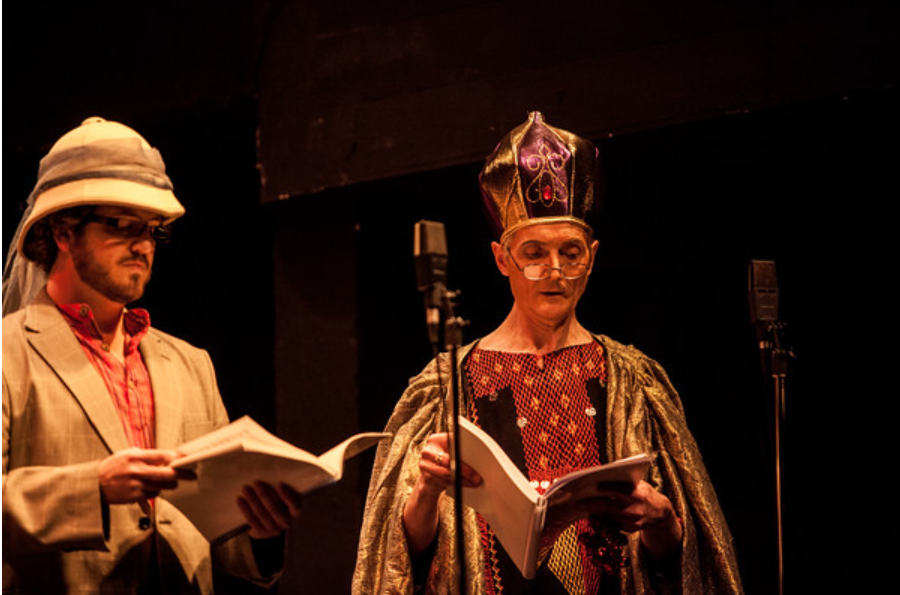
Andrew Inglis (l.) as Miradillo in “A Trip to Africa,” 2016. (Photo: Mark Stimpson Photography)
But you can’t expect a superstar cast – with great voices and acting abilities – at Maddermarket Theatre, can you? So to be fair, the mere fact that Mr. Salvi and his orchestra got this Afrikareise onto the stage at all, and recorded, with minimal budget, is a miracle. That the recording is now made available via mail order is another miracle, because it allows English speaking operetta fans to hear the show and use their imagination as to how it might sound in an ideal future version.
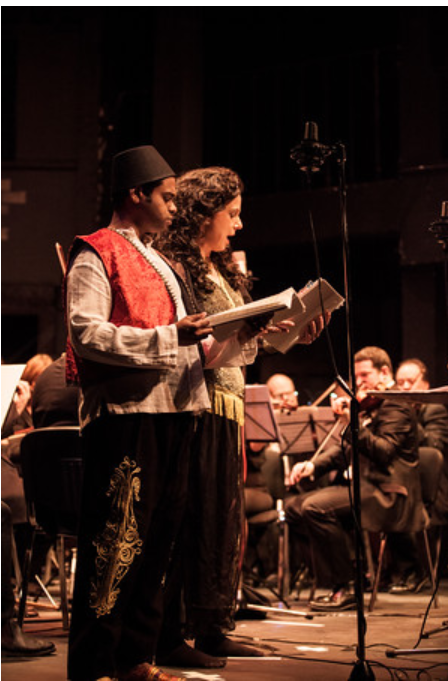
Two soloist from the 2016 “A Trip to Afrika.” (Photo: Mark Stimpson Photography)
Because the orchestra – especially the woodwinds – are sometimes severely out of tune, you also get an interesting listening experience. Any historic performance in Vienna 1883 or Boston 1884 did not have a first-class orchestra. So hearing Suppé’s music like this gives it a certain edge that I personally found rather fascinating, in a “period instruments” kind of way.
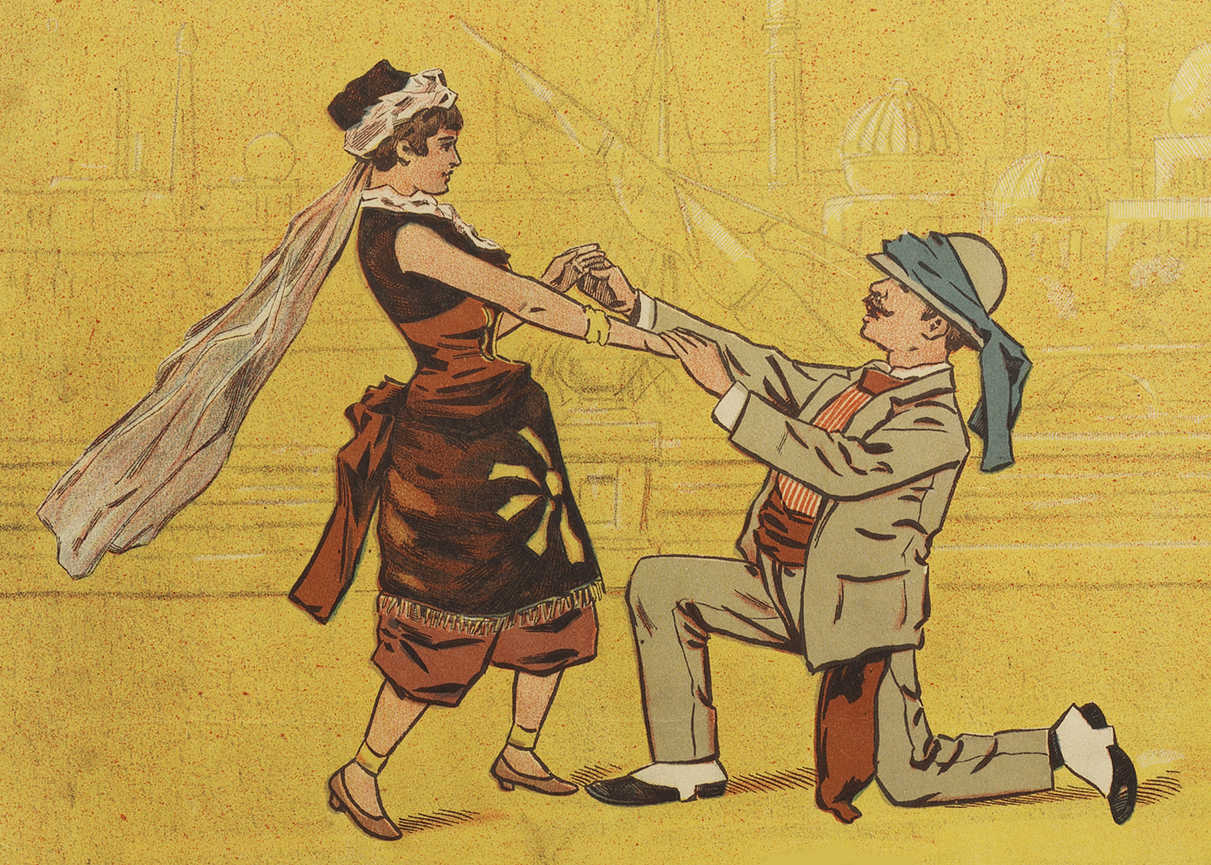
Tessa and Miradillo, from the poster of “A Trip to Africa” for the 1884 production at Haverly’s Theatre, Philadelphia. (Photo: Dario Salvi Collection)
But what of the music? Anyone expecting glorious 19th century orientalism will be disappointed. It’s mostly a ‘modern’ score filled with typical dance tunes from the era: polkas, waltzes, marches. However, there are various magic moments that deserve attention: the act 1 finale (“Now let the Tarabuka well be shaken, And from Kemeche’s strings Sweet music waken; Derwish flutes so loud and shrill, Now the air with piping fill”) is a sonic marvel.
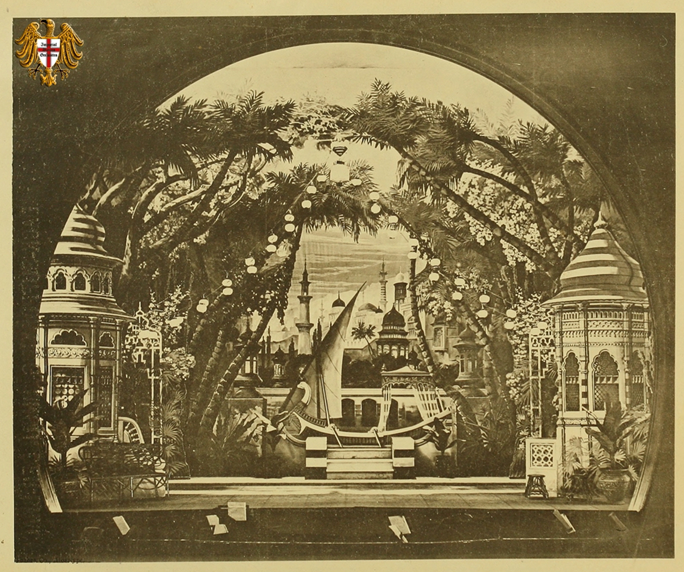
Act 2, the Garden of Fanfani on the banks of the River Nile. Originally published in “Historical review of the Boston Bijou Theatre,” 1884. (Photo: Dario Salvi Collection)
In act 2, set in a garden on the banks of the River Nile, there is a wondrous opening chorus (“Feasting, dancing, mirth and revels gay, In this house will reign today”) and a stunning invocation of “Allah” in the finale (“Bayram, the pleasant feast is here […] no sould should be with hatred fraught, Thus has the Prophet taught; A new life now believing, All injuries forgiving”).
In act 3, “An oasis in the interior of Africa with a view of the Sahara”, you get a dreamy tenor serenade from Prince Antarsid, with accompanying humming chorus: “Now dawns the morn, the darkness goes, On heaven’s bow stars paler grow [….]. Wake, maiden fair, cool is the air, Open thine eyes, on me let them beam.” On the CD, Djinh Kamei sings this serenade with an elegant slim tenor, but he’s missing the sweetness that is required, the seductiveness, and any typical operetta exaggeration.

Promotional trade cards from the 1884 production of “A Trip to Africa” at Haverly’s Theatre, Philadelphia. (Photo: Dario Salvi Collection)
On the other hand, Andrew Inglis in the Girardi-role of Miradillo (the European tourist) misses any comic timing. And when these gentlemen sing the many verses of their songs you wish they would not just sing them but bring some kind of linguistic differentiation to them. Such couplets need great acting and drastic vocal storytelling.
On the female side of the cast, Selina Hawker possesses a lovely timbre as Titania, the heiress who has to find a husband overnight to claim her multi-million inheritance from her uncle, Pasha Fanfani. Hawker’s soprano is, sadly, not really sweet enough for an interpretation focused so exclusively on singing instead of acting. And the other ladies – Rebecca Hunt as Tessa, a milliner from Palermo, and her mother Buccametta, sung by Felicity Devonshire – do not come across too well via microphone. (Possibly they all made a much better effect in the theater when you could see them.)
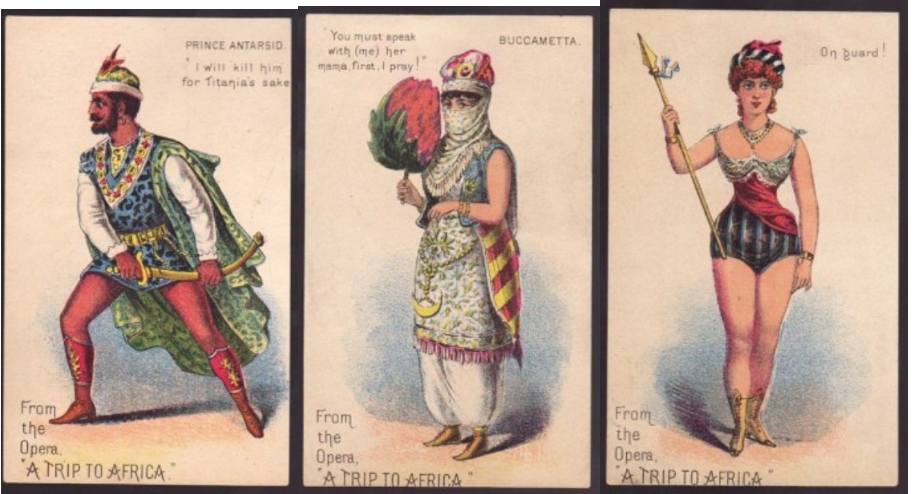
Promotional trade cards from the 1884 production of “A Trip to Africa” at Haverly’s Theatre, Philadelphia. (Photo: Dario Salvi Collection)
All singers sound, if such a generalized statement is permissible, like a very good modern Gilbert & Sullivan amateur operetta society performance. That has its merits. I already mentioned the great textual clarity and poise. (The only one who doesn’t follow that route is Dhilan Gananadurai as the hotel owner Pericles.) But like many G&S societies, they lack the fun element, the topsy turvey. And Afrikareise could use a lot of that!
Where does that leave things? Basically, if you are interested in Suppé and lesser-known operetta sung in English, then this is a must-have for your collection. It allows you to hear pretty much the full score, which was just edited and released by MUSICA MUNDANA. Which is, in a way, an invitation for other groups to explore the show and its possibilities futher. Perhaps the Ohio Light Opera will present a more “American” version, also on CD or DVD? It would be a perfect fit for them.
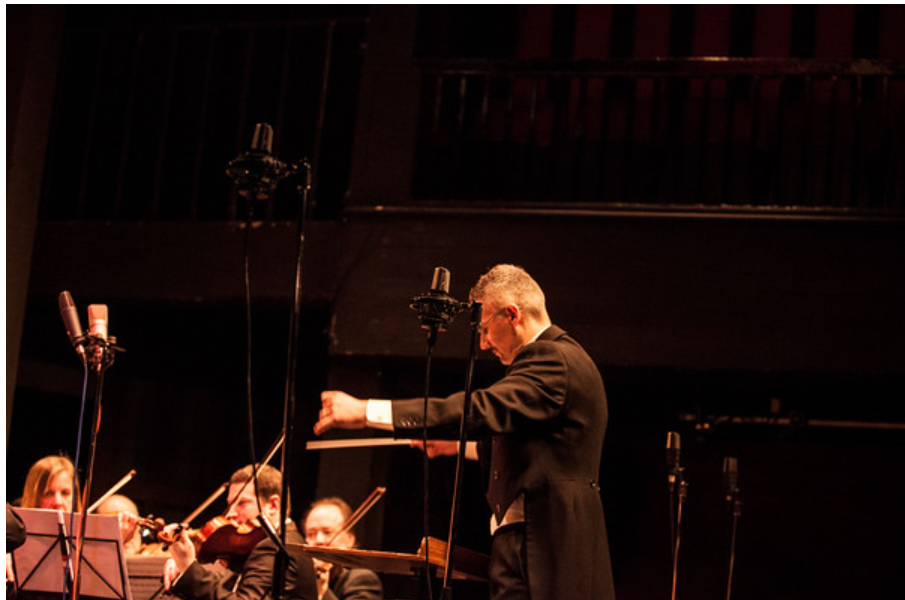
Dario Salvi conducting the Imperial Vienna Orchestra at Maddermarket Theatre, Norwich. (Photo: Mark Stimpson Photography)
Obviously, it would be worthwhile hearing the German language original, too, with an Austrian cast and orchestra. In Vienna, there is a new conductor with a special talent for this kind of music that needs rhythmic drive, not just for the famous marches. He’s called Cornelius Meister, and he’s the head of the ORF Radio-Symphonieorchester Wien. It would be thrilling to have an ORF performance of the original version, combined with a CD release.
Till then, this labor of love by Dario Salvi and the entire Maddermarket Theatre team needs to be applauded.
To order the CD (2 discs) for 10 British Pounds + shipping, send an email to: imperialviennaorchestra[@]gmx.co.uk

Dario Salvi is bringing rare operettas to life. This Suppe work and recording may bring about a revival of his operettas. His recording of Blindekuh is a gem and full of spirit.